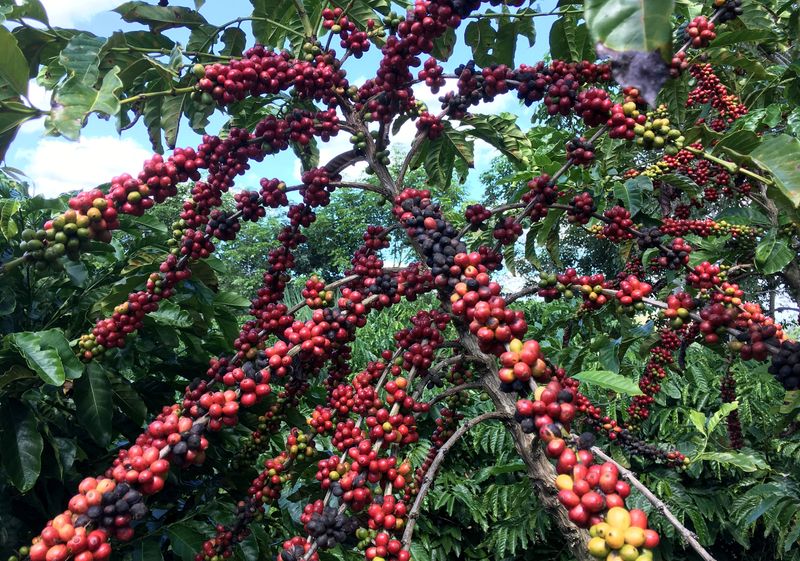By Roberto Samora
SAO PAULO (Reuters) - Brazil is expected to post its third annual increase in coffee production this year, a rare sequence seen only seven times in 144 years of coffee history in the world's largest grower and exporter of the beans, according to data compiled by Reuters.
The positive sequence is likely to be extended for another year in 2025, experts say, mainly due to rising production of robusta beans in a country that has historically been a producer of the milder arabica coffee preferred by high-end cafes. Robusta coffee is widely used to make instant coffee.
Brazilian coffee production usually alternates years of high and low production, in the arabica biennial cycle. Arabica coffee trees tend to produce less in a year following a good crop, or the other way around.
That cycle, experts say, was broken after extreme weather: a harsh drought and then freak frosts that hit Brazilian coffee fields around 2020 and 2021.
Since then, the country has been producing larger crops every year. The improvement is due to some post-frost farming techniques, such as pruning and expanded use of irrigation, particularly in robusta fields, to better cope with dry weather.
"The growth is a reality. ... No doubt next year's crop will be larger as well, taking this sequence of increases to four years," said Marcio Ferreira, chair of exporting group Cecafe.
The growing robusta production in Brazil is seen by analysts as a major contributor to more stable, rising overall coffee production. Robusta trees do not experience the biennial production variation of arabica.
"There are no frosts as well in the robusta production areas," said Celso Vegro, a coffee researcher at Instituto de Economia Agricola (IEA), referring to the states of Espirito Santo, Bahia and Rondonia, which are located more to the north, while arabica trees are mostly in Minas Gerais and Sao Paulo states in the Southeast.
The average yield of robusta fields in the country increased around 50% in 10 years to 44.2 bags (60 kg) per hectare, according to Brazil's food supply agency Conab. In contrast, yields on arabica fields increased 24% in the same period to 26.7 bags per hectare.
The possibility of four years of production increases would match something that happened only once in history, during 1989 to 1992, according to data from the International Coffee Organization, Conab and the book "150 Years of Coffee."
Conab estimates the 2024 crop at 58 million bags, up 5% from last year. Considering its data and projections, Brazil's production would reach 164 million bags in the three years from and including 2022.
The robusta expansion in Brazil happens at a time when the variety's main producer, Vietnam, faces difficulties related to adverse weather, which drove prices to their highest in at least 16 years.

"At some point, Brazil will likely produce more robusta beans than Vietnam," said Fernando Maximiliano, a coffee analyst at broker StoneX.
The harvest in Brazil starts around April for robusta trees, and around May or June for arabica fields.